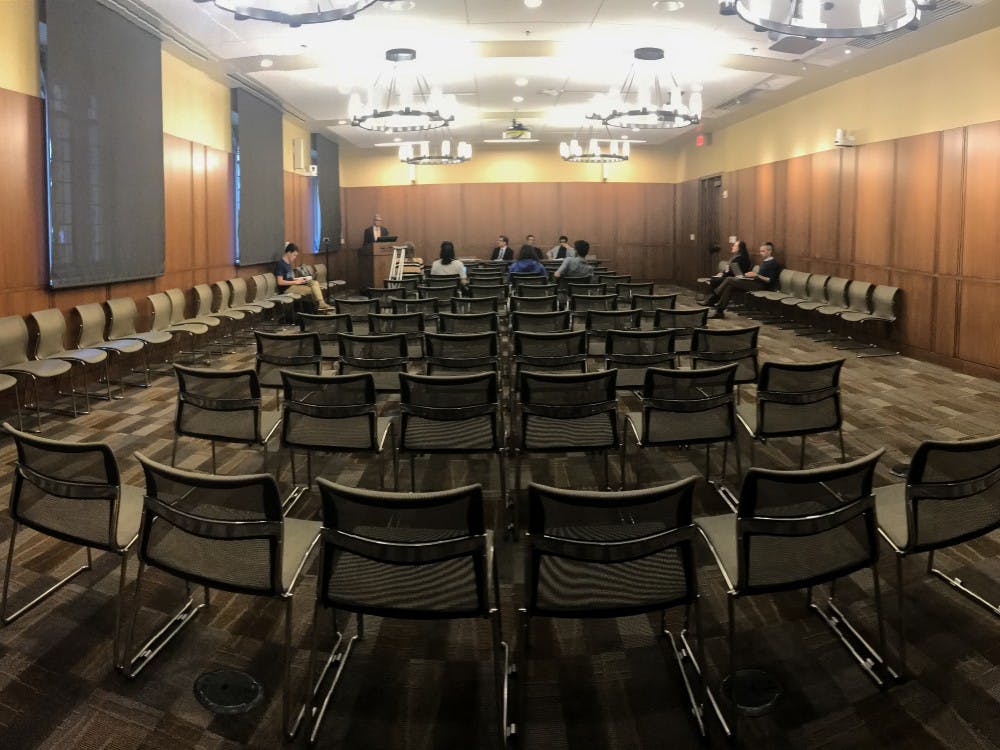Duke will not stop investing in companies that use fossil fuels, but President Vincent Price has approved several steps to promote alternative energy sources.
At the poorly-attended Advisory Committee on Investment Responsibility (ACIR) annual open forum this Monday Committee Chair Lawrence Baxter said that the committee recommended that Duke not divest from fossil fuel companies. However, he said that Price accepted several other recommendations, including marketing a socially-responsible fund for Duke donors and focusing on corporate governance.
In addition, a working group is examining the ACIR’s mission and structure as the committee deals with more complex issues.
Baxter, David T. Zhang professor of the practice of law, said that it would appear “rather hypocritical” for Duke to divest from fossil fuels without taking other steps to reduce harm to the environment. He added that the University’s direct investments in fossil fuel companies were small.
“We thought that that was not the most effective way, even though it might create some sort of symbolic statement,” Baxter said. “Rather, we explored other alternatives.”
The ACIR sent several recommendations to Price in a May report, which he considered this summer. Baxter said that Price approved of strengthening Duke Management Company’s (DUMAC) corporate governance capabilities, such as using proxy votes, making requests and joining shareholder resolutions to encourage companies to look into alternative energy sources.
Price also agreed that Duke should more effectively market its social choice (ESG) fund, to which socially-conscious donors can contribute, and explore the creation of a “green” fund focusing on environmental issues, Baxter said.
Finally, Price adopted the recommendation that the University should allocate funding to the student Duke Impact Investment Group (DIIG), which promotes socially- and environmentally-conscious investment.
Senior Saheel Chodavadia, a co-president of DIIG, serves as a student representative on the ACIR and was present at the forum.
Price was open to exploring the creation of a “carbon tax fund,” which would redirect profit from fossil-fuel investments to promote alternative energy sources, but did not endorse the creation of such a fund, Baxter said.
“Carbon tax is a very controversial way to address environmental issues,” Baxter explained, noting that environmental economists disagree on the merits of carbon taxation.
The ACIR is charged with making recommendations to the University president “regarding issues of socially responsible investing,” according to the committee’s charter. The president may then make a recommendation to the Board of Trustees, which directs the DUMAC regarding Duke’s investments.
In the past, the ACIR has recommended divestment from companies linked to apartheid in South Africa and the mining of conflict minerals. The push for fossil fuel divestment has been ongoing since 2014, when a group named Divest Duke, later folded into the Duke Climate Coalition, first lobbied ACIR to send a recommendation in favor of divestment.
At the forum, rows and rows of neat chairs lined up from the back of the room to the front, where a handful of students sat.
“It’s been pretty much the same each time,” Baxter said, referring to the nearly blank room.
It lasted from 4:00 p.m. to 5:00 p.m. and, at the point when the room was the most full, a total of four students who were not tied to The Chronicle or serving on the panel showed up.
The ACIR considers its own structure
Board of Trustees chair Jack Bovender has appointed a working group of faculty, students and administrators that will examine the ACIR’s structure and function.
The creation of the group follows another May report to Price. In the report, Baxter raised the prospect of discussing a model like Stanford’s, where a committee of the Board of Trustees addresses investment responsibility concerns raised by the University community.
The report was spurred by changes in the type of issues that ACIR addresses, Baxter said on Monday—they used to be relatively simple, such as apartheid and conflict minerals, but have grown much more complex.
Get The Chronicle straight to your inbox
Sign up for our weekly newsletter. Cancel at any time.
“When you get into something as systemic or system-wide as climate change, you do run into the very complex problems of how we solve these problems when we’re all so dependent, for example, on fossil fuels,” Baxter said. “It’s like being a vegetarian but wearing leather shoes.”
The working group will examine the Board of Trustees’s policy on socially responsible investing and the procedure for implementing it, said Senior Vice President Richard Riddell, secretary to the Board of Trustees and chair of the group, at the forum.
Examining policy will involve a “two pronged” approach, Riddell explained. First, the group must make clear that the endowment exists primarily to fund teaching and research, but must also allow action on issues like slavery and apartheid. Second, the group will think about the overall ethical principles that guide Duke’s investments.
Riddell added that the group will examine the process of bringing concerns to the Board of Trustees. Duke’s peer institutions can provide examples, he said, referring to Stanford’s system.
The working group aims to come up with ideas by the end of the calendar year, Riddell noted.
Matthew Griffin was editor-in-chief of The Chronicle's 116th volume.

